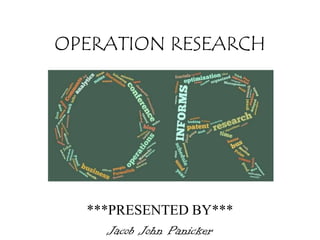Operation research
- 1. OPERATION RESEARCH ***PRESENTED BY*** Jacob John Panicker
- 2. PRESENTATION OUTLINE âĒ âĒ âĒ âĒ âĒ âĒ Project time cost trade off Project crashing Time cost trade off procedure Resource allocation Resource leveling Resource smoothing
- 3. PROJECT TIME COST TRADE OFF ï Project time can be reduced by crashing ï Normal time reduced, budget increase ï Use additional resource to complete on time
- 4. PROJECT CRASHING ïCrashing number of activities to reduce duration of project ïCost increases more quickly when time is reduced ïRelationship between normal time and cost and crash time and time is linear
- 6. TIME COST TRADE OFF PROCEDURE 1. Determine normal project completion time and associated critical path 2. Identify critical activities and compute cost slope cost slope= crash cost - normal cost crash time - normal time
- 7. 3. Identify and crash an activity time on critical path 4. If the critical path is still critical, return to step 3 5. Terminate the procedure after each critical activity crashed to its lower possible time
- 8. RESOURCE ALLOCATION ïResources are:men, money, material, machinery etc.., ïNetwork analysis PERT/CPM is carried out using unlimited resources ïResources may not be uniform throughout the project
- 9. RESOURCE LEVELLING ï Stabilize rate of resource utilization without changing project duration ï Total float of non-critical activity ï Shift non-critical activity between earliest start time and latest allowable time can lower maximum resource requirement i. Total float=free float can be scheduled between earliest start and latest times ii. Total float>free float starting time can be delayed
- 10. RESOURCE SMOOTHING ïReduce peak demand for resources and reallocate them and shortest duration I. Calculate earliest start and latest finish times, draw time scaled network II. Draw resource histogram III. Shift the start time of those non-critical activities
- 11. CONCLUSION I conclude by saying that to reduce the time duration the cost of the project will be increased. The crash point is the point beyond which the time cannot be reduced nor the cost can be increased.
- 12. THANK YOU












